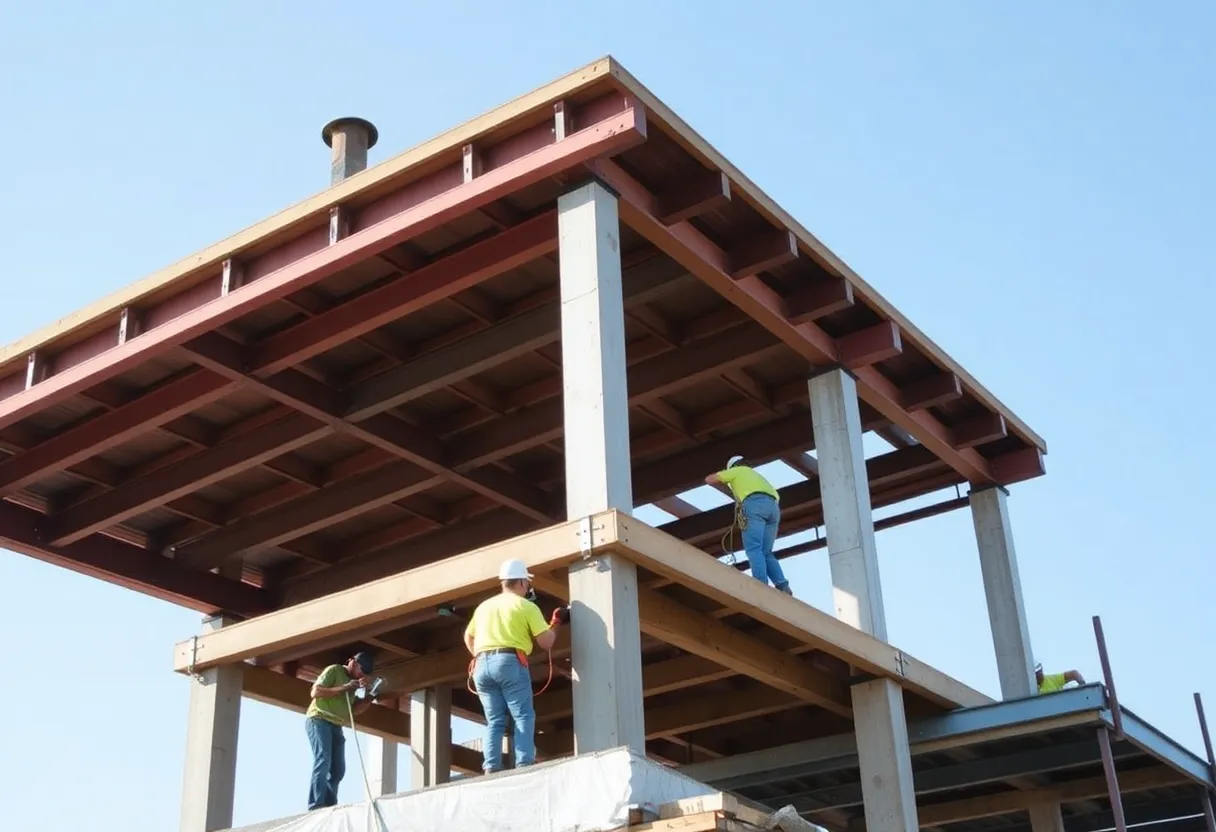USA, October 9, 2025
News Summary
The One Big Beautiful Bill Act (OBBBA) proposes significant tax relief for construction firms, introducing permanent bonus depreciation and higher Section 179 limits. These changes aim to alleviate labor shortages and rising costs by enabling immediate deductions for equipment and research expenditures. As the construction industry faces critical hiring challenges, the OBBBA supports firms in modernizing technology and improving cash flow. With an estimated need for nearly 439,000 new workers, this legislation offers a pathway to innovation while addressing the financial pressures of the sector.
Construction Firms Gaining Major Tax Relief Under ‘One Big Beautiful Bill Act’ to Combat Labor Shortages and Rising Costs
The One Big Beautiful Bill Act (OBBBA) is set to provide substantial tax relief for construction firms aiming to address ongoing labor shortages and increasing costs. This act introduces permanent 100% bonus depreciation applicable to construction companies, a game-changer for those looking to modernize their equipment and improve cash flow.
Additionally, the act increases Section 179 limits to $2.5 million, coupled with a $4 million phase-out threshold. This allows businesses greater flexibility in expensing asset costs immediately rather than capitalizing them. Such adjustments are critical for contractors needing immediate financial relief to stay competitive.
Another significant aspect of the OBBBA restores deductions for domestic research and experimental (R&E) expenditures. This reversal eliminates the previous requirement for businesses to capitalize and amortize these costs over five years, making it easier for firms to engage in research and development.
As companies grapple with rising costs, the Equipment Leasing and Finance Foundation has indicated that 42% of businesses within the sector plan to increase investments in equipment and software this year, with 32% citing labor costs and shortages as key motivations.
The construction industry is significantly affected by these labor shortages, with 94% of construction firms reporting challenges in filling open positions this year. The Associated Builders and Contractors estimate that the industry will require approximately 439,000 new workers to meet the current demand.
Historically, the Tax Cuts and Jobs Act (TCJA) stipulated that businesses needed to capitalize R&E expenses, which posed cash flow challenges, especially for small and medium-sized firms focused on innovation. While the TCJA provided beneficial 100% bonus depreciation for qualifying equipment, it scheduled a phase-out process starting in 2023, adding uncertainty for business planning.
The OBBBA extends the 100% bonus depreciation provision indefinitely, alleviating fears about its impending expiration. This newfound stability allows companies to invest with greater confidence, improving their competitiveness as they navigate ongoing economic pressures.
Unlike the TCJA, the OBBBA offers more favorable tax planning by permitting contractors to deduct R&E expenditures incurred in the same year rather than spreading them out over multiple years. Under IRC Section 59(e), taxpayers can also choose to reclaim domestic R&E expenditures over a decade, providing further flexibility for tax strategies.
Moreover, the act clarifies that expenditures related to software development fall under R&E, which removes previous ambiguities. 100% bonus depreciation enables firms to deduct equipment costs as soon as they are put into service, significantly enhancing cash flow. By maximizing the advantages of the rewritten Section 179 limits for larger capital expenditures, businesses can effectively manage their financial outlays.
Many construction companies are expected to utilize these immediate tax benefits to modernize their technology and machinery, leading to improved operational efficiency and safety. The OBBBA specifically addresses the challenges presented by the high maintenance costs and rapid turnover of heavy construction equipment.
With new tax frameworks, firms will have the ability to promptly write off equipment costs, facilitating timely updates and expansions to their machinery fleets. The enhanced operational efficiency can be crucial for businesses struggling with labor shortages, allowing them to refine their planning and capital expenditure strategies.
The enactment of the OBBBA is viewed as a critical measure to help the construction industry navigate financial pressures linked to material costs and tariffs. Effectively leveraging this act could position construction firms at the forefront of advancements in infrastructure.
This new law presents pathways for firms to invest with fewer barriers than those imposed by prior regulations, ultimately fostering a more innovative and competitive landscape within the industry.
FAQ Section
What is the One Big Beautiful Bill Act (OBBBA)?
The OBBBA provides substantial tax relief for construction firms, including permanent 100% bonus depreciation and increased Section 179 limits, aimed at addressing labor shortages and rising costs.
How does OBBBA help with research and experimental expenditures?
The act restores deductions for domestic R&E expenditures, allowing businesses to deduct these costs in the year incurred instead of capitalizing and amortizing them over five years.
What challenges does the construction industry face regarding labor?
94% of construction firms report difficulties in filling open positions, highlighting the industry’s ongoing labor shortages, which will require around 439,000 new workers to meet demand.
How does OBBBA affect small and medium-sized businesses?
The OBBBA alleviates cash flow burdens imposed by previous legislation like TCJA, enhancing tax strategy flexibility and promoting investment in innovation and equipment modernization.
Key Features of the One Big Beautiful Bill Act (OBBBA)
| Feature | Description |
|---|---|
| 100% Bonus Depreciation | Permanent provision allowing immediate deduction of equipment costs when placed in service. |
| Section 179 Limits | Increased to $2.5 million with a $4 million phase-out for greater immediate expensing. |
| Restored R&E Deductions | Eliminates prior requirements to capitalize and amortize domestic R&E expenditures. |
| Labor Shortages Addressed | Supports investment strategies to combat ongoing labor challenges in the construction industry. |
| Tax Strategy Flexibility | Allows for easier planning regarding R&E and capital expenditures. |
Deeper Dive: News & Info About This Topic
Additional Resources
- CNBC: Trump Tax Cuts Calculator
- Wikipedia: Tax Relief
- Fast Company: Tax Calculator for 2026 Taxes
- Google Search: Tax Calculator
- Utility Dive: Navigating One Big Beautiful Bill
- Encyclopedia Britannica: Taxation
- MSNBC: One Big Beautiful Bill Rebranding
- Google News: One Big Beautiful Bill
Author: Construction FL News
The FLORIDA STAFF WRITER represents the experienced team at constructionflnews.com, your go-to source for actionable local news and information in Florida and beyond. Specializing in "news you can use," we cover essential topics like product reviews for personal and business needs, local business directories, politics, real estate trends, neighborhood insights, and state news affecting the area—with deep expertise drawn from years of dedicated reporting and strong community input, including local press releases and business updates. We deliver top reporting on high-value events such as the Florida Build Expo, major infrastructure projects, and advancements in construction technology showcases. Our coverage extends to key organizations like the Associated Builders and Contractors of Florida and the Florida Home Builders Association, plus leading businesses in construction and legal services that power the local economy such as CMiC Global and Shutts & Bowen LLP. As part of the broader network, including constructioncanews.com, constructionnynews.com, and constructiontxnews.com, we provide comprehensive, credible insights into the dynamic construction landscape across multiple states.





